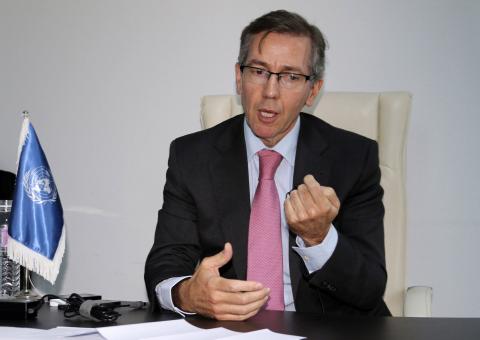Advertisement
U.N. to talk with Libyan militias as next step in peace process
TUNIS (Reuters) - The United Nations plans to hold talks with the militias that have seized control of vast parts of Libya, hoping to persuade them to withdraw from major cities and avert civil war, the U.N. envoy there said.
On Monday, initial U.N.-brokered talks began between Libya's parliament - which has been forced out of the capital - and elected members who have boycotted the assembly and who have links to a rival parliament that has set up in Tripoli.
Bernadino Leon, the U.N. special envoy to Libya, said a second step would be to seek talks with the militias that now run the desert nation three years after the uprising that ended the 42-year-rule of Muammar Gaddafi.
“The United Nations will start talking to the militias in order to try and solve the problems provoked by the presence of these militias on the ground," Leon told Reuters in an interview in Tunis.
He said the talks that started on Monday, in Ghadames, a southern town near the Algerian border, were aimed at getting a political process started, but the lawmakers involved did not directly represent the militias who control Tripoli and other parts of the country.
"The goals will be getting militias out of the main cities as a first step ... and of course eventually to reorganize the security in the country with an army," he said, adding: "Of course we are very far from that."
After Monday's talks, Leon said both sides had agreed on the need for a ceasefire, for humanitarian aid for victims of clashes in Tripoli, and to work to reopen airports closed by fighting.
There was no immediate reaction from Operation Dawn, an alliance of brigades which now controls Tripoli, led by militiamen from the western city of Misrata.
But, in a blow to the peace process, Libya's top Islamic authority, Dar al-Ifta, which is close to the Misrata side, urged a halt to the talks to wait for a Supreme Court ruling on whether the House of Representatives was legitimate.
The court is supposed to rule next month but diplomats fear it will not be able to issue an independent verdict as it is based in Tripoli, controlled by the Misrata forces that oppose the House.
Mohammed Rayed, elected to the assembly from Misrata but who has boycotted its sessions, told Reuters he would abide by the call of the Islamic authority. "We have to comply to what the Dar al-Ifta has called for," he said.
The fluid situation in Tripoli has been worsened by a separate battle in Benghazi where pro-government forces are fighting Islamist militants.
One person was killed and three wounded when clashes broke out between residents and the Ansar al-Sharia Islamist group in the port city late on Tuesday, witnesses said.
(Reporting by Ahmed Elumami, Feras Bosalum, Ayman al-Warfalli and Heba al-Shibani; Writing by Ulf Laessing; Editing by Robin Pomeroy)



















Add new comment